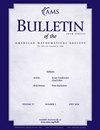稳定的黑洞:在真空中和更远的地方
IF 1.6
3区 数学
Q1 MATHEMATICS
引用次数: 2
摘要
黑洞是我们理解宇宙的重要对象,因为它们代表了广义相对论的极端性质。它们背后的数学具有令人惊讶的几何性质,它们的动力学由双曲偏微分方程控制。人们可能会问的一个基本问题是,爱因斯坦方程的这些解在小扰动下是否稳定,这是具有物理意义的典型要求。我们给出了关于已知黑洞解稳定性问题的主要猜想,并给出了关于真空情况下黑洞的完全非线性演化及其与物质场相互作用的一些最新定理。本文章由计算机程序翻译,如有差异,请以英文原文为准。
Stable black holes: in vacuum and beyond
Black holes are important objects in our understanding of the universe, as they represent the extreme nature of General Relativity. The mathematics behind them has surprising geometric properties, and their dynamics is governed by hyperbolic partial differential equations. A basic question one may ask is whether these solutions to the Einstein equation are stable under small perturbations, which is a typical requirement to be physically meaningful. We illustrate the main conjectures regarding the stability problem of known black hole solutions and present some recent theorems regarding the fully nonlinear evolution of black holes in the case of vacuum and their interaction with matter fields.
求助全文
通过发布文献求助,成功后即可免费获取论文全文。
去求助
来源期刊
CiteScore
2.90
自引率
0.00%
发文量
27
审稿时长
>12 weeks
期刊介绍:
The Bulletin publishes expository articles on contemporary mathematical research, written in a way that gives insight to mathematicians who may not be experts in the particular topic. The Bulletin also publishes reviews of selected books in mathematics and short articles in the Mathematical Perspectives section, both by invitation only.

 求助内容:
求助内容: 应助结果提醒方式:
应助结果提醒方式:


